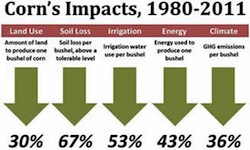The Iowa Renewable Fuels Association (IRFA) has unveiled a list of 10 ways the renewable fuels industry is helping to improve the environment. According to IRFA, renewable fuels offer positive impacts on the environment compared to petroleum-based counterparts.
“Renewable fuels make our planet a better place to live with healthier air and water, and that’s exactly what Earth Day is all about,” said IRFA Executive Director Monte Shaw. “Smart energy policies like the Renewable Fuel Standard (RFS) encourage the production and use of cleaner, more environmentally friendly fuels like E15 and B20 that significantly reduce the environmental harm that is caused by petroleum-based fuels.”
 The following Top 10 list highlights ways in which ethanol and biodiesel have benefited the environment over the past decade through improvements at the plant, on the farm, and out of the tailpipe.
The following Top 10 list highlights ways in which ethanol and biodiesel have benefited the environment over the past decade through improvements at the plant, on the farm, and out of the tailpipe.
1. According to the U.S. Department of Agriculture (USDA), for every unit of fossil energy needed to produce biodiesel, 5.5 units of energy are gained, while ethanol generates 2.3 units of energy for every unit of fossil energy input. By comparison, gasoline and diesel fuel have negative energy balances.
2. The adoption of regenerative thermal oxidizers (RTO) has significantly reduced volatile organic compound emissions from ethanol plants.
3. On a per gallon basis, today’s ethanol plants require 28% less thermal energy and 32% less electricity than a decade ago, according to the University of Illinois at Chicago.
4. According to the U.S. Environmental Protection Agency (EPA), biodiesel reduces greenhouse gases (GHG) by up to 86% compared to petroleum diesel, while Yale University found that ethanol reduces GHG by up to 59% compared to gasoline.
5. Water used to produce a gallon of ethanol has dropped 40% over the last decade, while biodiesel production reduces wastewater by 79% and hazardous waste by 96% when compared to petroleum diesel.
6. Increased income from ethanol demand for corn has allowed farmers to invest in precision farming equipment and stronger conservation and environmental protections.
7. The environmental footprint of U.S. corn production has improved greatly since the advent of the ethanol industry, including significant reductions in soil loss, irrigation, energy use and the amount of land required to produce a bushel of corn.
8. Ethanol and biodiesel are both biodegradable and non-toxic.
9. Biodiesel and ethanol significantly reduce tailpipe carbon monoxide emissions, air toxics, fine particulate matter and smog pollution compared to petroleum diesel and gasoline, making our air healthier to breathe.
10. Since the beginning of the RFS, biodiesel use alone has reduced lifecycle greenhouse gas (GHG) emissions by nearly 74 billion pounds, the equivalent of removing 5.4 million vehicles from U.S. roads.

